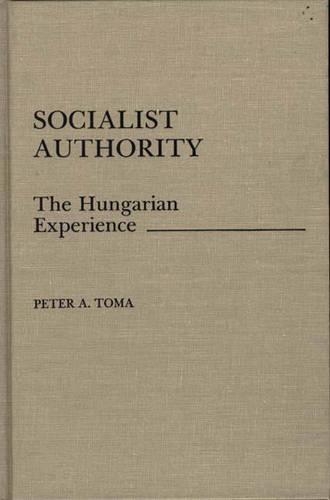
Socialist Authority: The Hungarian Experience
(Hardback)
Publishing Details
Socialist Authority: The Hungarian Experience
By (Author) Peter A. Toma
Bloomsbury Publishing PLC
Praeger Publishers Inc
22nd February 1988
United States
Classifications
Tertiary Education
Non Fiction
306.09439
Physical Properties
Hardback
315
Description
Careful followers of reform movements within Communist bloc countries will profit from this new work by a specialist on Hungarian politics. Twenty years after introduction of the New Economic Mechanism (NEM), both the Hungarian elite and the mass population have had mixed experiences with the process of reform. From the vantage point of the elite, in the 1980s reform has moved beyond the economic realm into the political. Passage of the new Electoral Law of 1983 resulted in the transfer of more power to locally elected governmental bodies and also produced contested elections for legislative seats. Choice Toma addresses the question: What are the factors and variables that permit one socialist system to exercise more economic, political, and social freedom than another He studies authority in contemporary Hungarian society with an emphasis on communist practices versus ideological absolutes. He tests some generally accepted views of the socialist system in Hungary and shows how the Hungarians have attempted to resolve the question of how to combine socialist economic planning with social justice. Through a series of case studies, he differentiates between the theory and the practice of socialist authority, mainly through an analysis of how Hungarians have learned to circumvent restrictions imposed by the regime.
Reviews
Careful followers of reform movements within Communist bloc countries will profit from this new work by a specialist on Hungarian politics. Twenty years after introduction of the New Economic Mechanism (NEM), both the Hungarian elite and the mass population have had mixed experiences with the process of reform. From the vantage point of the elite, in the 1980s reform has moved beyond the economic realm into the political. Passage of the new Electoral Law of 1983 resulted in the transfer of more power to locally elected governmental bodies and also produced contested elections for legislative seats. . . The author makes his point about mass society through a useful combination of extended perrsonal case histories with basic data pertaining to many important social indicators. In many regards, the conclusions are similar to those presented by Hans-Georg Heinrich in Hungary (CH Sep 86). However, Toma is more pessimistic than Heinrich about the overall impact of the NEM.-Choice
"Careful followers of reform movements within Communist bloc countries will profit from this new work by a specialist on Hungarian politics. Twenty years after introduction of the New Economic Mechanism (NEM), both the Hungarian elite and the mass population have had mixed experiences with the process of reform. From the vantage point of the elite, in the 1980s reform has moved beyond the economic realm into the political. Passage of the new Electoral Law of 1983 resulted in the transfer of more power to locally elected governmental bodies and also produced contested elections for legislative seats. . . The author makes his point about mass society through a useful combination of extended perrsonal case histories with basic data pertaining to many important social indicators. In many regards, the conclusions are similar to those presented by Hans-Georg Heinrich in Hungary (CH Sep 86). However, Toma is more pessimistic than Heinrich about the overall impact of the NEM."-Choice
Author Bio
PETER A. TOMA is a Professor of Political Science and International Relations at the University of Arizona.
